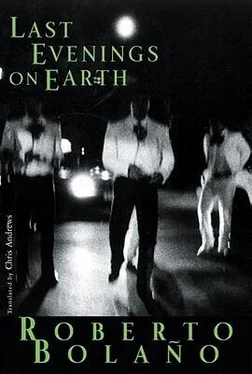One day, however, B runs into U's wife in the Boqueria market. He sees her from a distance. She is with a young woman he doesn't know. They have stopped in front of a stall selling tropical fruit. As he approaches them, B notices that there is something different about U's wife, a new depth to her face. She is not just a pretty woman anymore; now she is interesting as well. He says hello to them. U's wife responds rather coldly, as if she didn't recognize him. Which is what B thinks has happened at first, so he proceeds to explain who he is. He reminds her of the last time they saw each other, the book she recommended; he even mentions the ill-fated party at which they first met. U's wife keeps nodding, but it is clear that she is increasingly ill at ease, as if she were wishing she could somehow make him vanish. Although he is disconcerted, and knows deep down that the best thing to do would be to say good-bye immediately and go, he stays. What he is really waiting for is something — a signal, a word — to make it quite clear that his presence is unwelcome. But no such signal eventuates. U's wife is simply trying not to see him. Her friend, by contrast, is observing him carefully, and B clings to her gaze as if it were a lifeline. Her name is K and she is Danish, not Chilean. Her Spanish is bad but comprehensible. She hasn't been living in Barcelona for long and hardly knows the city. B offers to show her around. K accepts.
So that night B meets the Danish woman and they walk around the Gothic Quarter (Why am I doing this? he wonders, while she is happy and slightly drunk — they have visited a couple of old taverns), and they talk and K points out the shadows their bodies are throwing on the old walls and the paving stones. These shadows have a life of their own, says K. At first B thinks nothing of her remark. But then he observes his shadow, or perhaps it is hers, and for a moment that elongated silhouette seems to be looking askance at him. It gives him a start. Then all three or four of them are swallowed up by the shapeless dark.
That night he sleeps with K. She is studying anthropology with U's wife and although they are not what you would call close friends (in fact they are only classmates), as dawn begins to break, K starts talking about her, perhaps because she is their only mutual acquaintance. B can't make much sense of what she says; it is full of commonplaces. U's wife is a good person, always ready to do you a favor, a bright student (What does that mean? wonders B, who has never been to college), although — and this she states without any evidence, relying solely on her female intuition — she has lots of problems. What kind of problems? asks B. I don't know, says K, all sorts.
The days go by. B has stoped visiting Barcelona's Chilean exiles in the hope of finding U and his wife. Every two or three days he sees K and they make love, but they don't talk about U's wife, or if, occasionally, K mentions her, B pretends not to notice or listens in a deliberately distant, indifferent manner, trying to be objective (and succeeding without too much effort), as if K were talking about social anthropology or the little mermaid of Copenhagen. He returns to his old routines, that is, to his own madness or his own boredom. His relationship with K involves no socializing, so he is spared any unwelcome or chance encounters.
One day, long after his last visit, he happens to drop in on his friends the Chilean couple.
B is not expecting them to have company. B is expecting to have dinner with them, so he shows up bearing a bottle of wine. But on arrival he finds the house virtually overrun. His friends are at home, but there is also another Chilean woman, about fifty years old, a tarot card reader by trade, and a pale, surly girl, about seventeen, who has a reputation (undeserved, as it will turn out) among the exiled Chileans as something of a prodigy (she is the daughter of a union leader killed under the dictatorship), along with her boyfriend, a Catalan Communist Party official at least twenty years older than she is, plus U's wife, who has been crying, to judge from her eyes and the color of her cheeks, while in the living room, apparently oblivious to what is going on around him, U sits in an armchair.
B's first impulse is to take his bottle of wine and leave immediately. But he reconsiders, and although he is unable to come up with a single good reason to stay, he does.
The atmosphere at his friends' house is funereal. The mood and the observable activity suggest a clandestine meeting, and not just one inclusive affair, but rather a series of mini- or splinter-meetings, as if a conversation involving everyone were prohibited by an unstated but universally respected rule. The tarot card reader and the hostess shut themselves in the host's study. The pale girl, the host, and U's wife shut themselves in the kitchen. The pale girl's boyfriend and the hostess shut themselves in the bedroom. U's wife and the pale girl shut themselves in the bathroom. The tarot card reader and the host shut themselves in the corridor, which is no mean feat. With all the coming and going, B even finds himself shut in the guest room with the hostess and the pale girl, listening through the wall to the high-pitched voice of the tarot card reader addressing or solemnly admonishing U's wife, the pair having shut themselves in the rear courtyard.
Meanwhile one person remains quite still, as if the agitation had nothing to do with him or were taking place in a world of illusions: U, in his armchair in the living room. Which is where B goes after being subjected to a flood of vague if not contradictory reports, from which only one thing emerges clearly: U tried to kill himself that morning.
In the living room, U greets him with an expression that could hardly be called friendly, but is not aggressive. B sits down in an armchair opposite U. For a while, they both remain silent, looking at the floor or watching the others come and go, until B realizes that U has the television on, with no sound, and seems to be interested in the program.
Nothing in U's face indicates suicidal tendencies, thinks B. On the contrary, there are signs of what could reasonably be interpreted as a new calm, new to B in any case. When he thinks of U, he sees his face as it was at the party: flushed, caught between fear and malice; or the day they met in the Ramblas: an expressionless mask (although it is hardly more expressive now) behind which lurked monsters of fear and malice. The new face has a freshly washed look. As if U had spent hours or maybe days submerged in a powerful torrent. If not for the soundless TV and U's dry eyes carefully following every movement on the screen (while the house is alive with the whispers of the Chileans, engaged in pointless discussions about the possibility of having him committed to Sant Boi again) B might not feel that something extraordinary is going on.
And then what appears at first to be an insignificant movement begins (or rather emerges), a kind of ebbing or backwash: without budging from his armchair, B watches as all the guests (who up to a moment before were conferring or confabulating in little groups) file toward the hosts' bedroom, all except the pale girl, the daughter of the assassinated union leader, who comes in to the living room (is it rebellion or boredom, he wonders, or is she just keeping an eye on us?) and sits herself down on a chair not far from the armchair in which U is ensconced, watching television. The bedroom door closes. The muffled sounds cease.
This might be a good moment to leave, thinks B. But instead he opens the bottle and offers them a glass of wine, which the pale girl accepts without batting an eyelid, as does U, although he seems unwilling or unable to drink and takes only a sip, as if not to offend B. And as they drink, or pretend to drink, the pale girl starts talking, telling them about the last movie she saw, It was awful, she says, and then she asks them if they have seen anything good, anything they could recommend. The question is, in fact, rhetorical. By posing it the pale girl is tacitly establishing a hierarchy in which she occupies a position of supremacy. Yet she observes a certain queenly decorum, for the question also implies a disposition (on her part, but also on the part of a higher agency, moved by its own sovereign will) to grant both B and U places in the hierarchy, which is a clear indication of her desire to be inclusive, even in circumstances such as these.
Читать дальше












